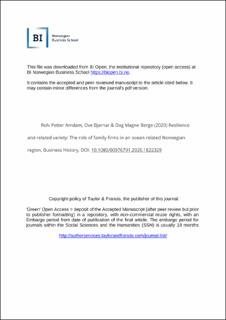Resilience and related variety: The role of family firms in an ocean-related Norwegian region
Journal article, Peer reviewed
Accepted version

View/
Date
2020Metadata
Show full item recordCollections
- Scientific articles [2181]
Abstract
Recent research in economic geography has introduced two notions that historical studies should explore: regional resilience and related variety. Regional resilience refers to a region’s ability to recover from external shocks. Related variety refers to the existence of related industrial sectors in a region, and the relatedness promotes economic development due to spill-overs between sectors. From an evolutionary perspective, external shocks result in new development paths in regions with related variety. This is a dynamic process well suited to historical studies. This article argues that historical studies can contribute to this literature by studying how related sectors interact in resilient regions. We propose that family firms may act as a micro-coordination mechanism by moving financial and human resources from one sector to another related sector as a response to shock. The paper develops this argument by studying how six major regional business families within ocean industries reacted to external shocks over time.